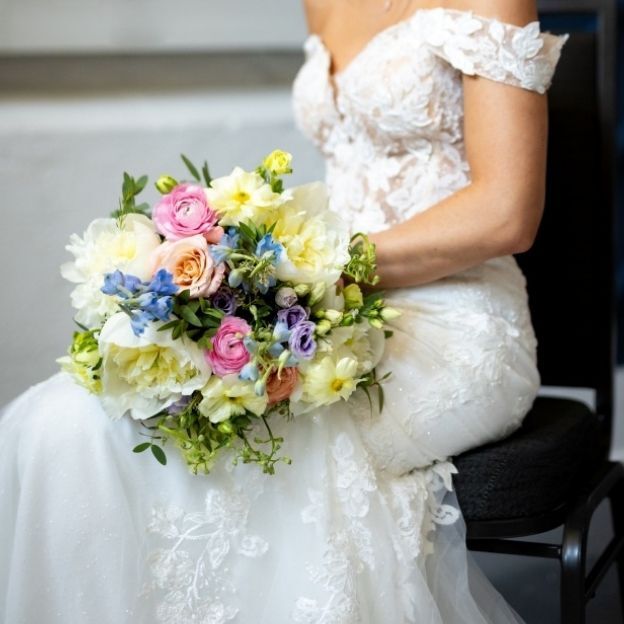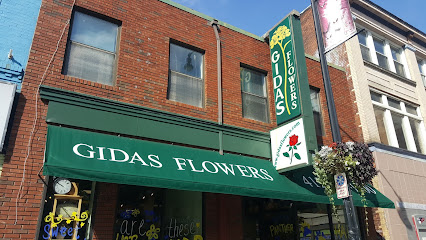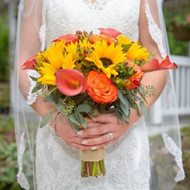Top Wedding Florist in Pittsburgh, PA for Your Dream Celebration
22nd Jul 2025
With over 100 years of floral craftsmanship under our belt, Gidas Flowers has grown alongside Pittsburgh’s wedding scene. As a seasoned wedding florist in Pittsburgh, PA, we’ve seen every style and venue, so we’re sharing this guide to help you navigate the wedding flower process with confidence, from your first consultation through day-of delivery and setup.
Getting Started: The Initial Consultation
A well-prepared first meeting lays the groundwork for every bouquet, boutonniere, and centerpiece that brings your dream wedding to life.
What to gather before you inquire
Before you reach out, compile key details to streamline the conversation and ensure you secure the freshest flowers and most beautiful bouquet options:
- Date & venue photos: Visual context helps florists understand space and scale, from a grand ballroom to an intimate loft in the greater Pittsburgh area.
- Guest count estimate: Rough numbers guide how many stems you’ll need for centerpieces, boutonnieres, and ceremony accents.
- Style inspiration: Clip examples of floral arrangements—whether you gravitate toward soft pink roses, bold orange dahlias, or mixed-texture designs—to convey your aesthetic.
Questions to expect from your florist
Your florist will dive into specifics that shape both artistry and logistics, asking about:
- Budget range & priorities: Which elements matter most—your bridal bouquet’s statement impact, table centerpieces, or ceremony décor?
- Seasonal preferences: Are you open to any fresh, locally available blooms, or do you have “must-haves” in mind?
- Service scope: Will you need full-service delivery and setup, or would you prefer a simpler pick-up for DIY assembly?
- Logistics & timing: What load-in windows does your venue offer, and how can florists coordinate delivery to keep flowers at peak freshness on your wedding day?
Coming prepared for these topics makes the consultation easy, focused, and one step closer to capturing the essence of your celebration.
Design & Proposal Phase
After your initial consultation, this stage turns ideas into actionable plans for your flower arrangements and beautiful flowers throughout your wedding.
Translating your vision into a detailed proposal
Your florist will outline bouquet styles, centerpiece concepts, and any ceremony décor, complete with descriptions of focal blooms, color palettes, and textures. This proposal typically includes a rough cost estimate, helping you understand how each element contributes to your overall budget.
What to expect in revisions and visual aids
Most florists offer at least one round of revisions, allowing you to tweak quantities, swap flower varieties, or adjust color tones. You may also receive sample imagery or simple layout sketches to visualize placement and scale, ensuring the final arrangements reflect exactly what you imagined.
Budget Planning & Timeline
Lining up your budget and key dates early keeps your wedding florals on track and on budget.
Industry benchmarks: Typical spend for Pittsburgh couples
Many couples allocate between $3,500 and $8,000 for wedding flowers, which generally covers the bridal bouquet, boutonnieres, ceremony arrangements, and reception centerpieces. Understanding this range helps you set realistic expectations for the scope and scale of your flower arrangements.
Recommended booking window & key milestones
- 6–12 months out: Secure your florist and confirm your wedding date to lock in availability and peak-season blooms.
- 3 weeks out: Confirm final guest counts and event layout so your florist can accurately order stems and greenery.
- 1 week out: Review delivery details, load-in times, and setup instructions to ensure flowers arrive fresh and are installed seamlessly on your wedding day.
Selecting Styles & Flowers
Nailing your style and timing your blooms makes all the difference in creating arrangements your guests will love.
Defining your aesthetic: Classic, modern, garden-style, textural
Start by deciding what speaks to you today. Are you drawn to the timeless symmetry of classic bouquets or the clean lines of modern floral arrangements? Perhaps you’re interested in a garden-style look, with loose clusters and wild touches, or a textural design that plays with unexpected contrasts.
Whatever you choose, this decision will guide every petal and stem, helping you create a perfect visual narrative for your wedding day.
Seasonality guide for Western PA blooms
Check the calendar before you order:
- Spring (March–May): Tulips, ranunculus, and early daffodils offer soft pastels and fresh beginnings.
- Summer (June–August): Peonies, sunflowers, and zinnias deliver vibrant “yellow” accents and rich texture.
- Fall (September–October): Dahlias, mums, and ornamental grasses bring warm tones that feel right at home in an autumn celebration.
- Winter (November–February): Evergreen sprigs, berries, and hellebores create a fragrant, low-waste palette perfect for cozy indoor venues.
By aligning your flower selections with the season, you’ll ensure the freshest flowers, support local growers, and give your guests an experience that feels both natural and artfully curated.
Service Models Explained
Choosing the right service model helps you balance hands-on involvement, budget, and event scale—ensuring every detail is handled with the care your celebration deserves.
Retail pick-up
Pros:
- Lower costs since you only pay for stems and supplies.
- Full personal control over every bouquet and boutonniere.
- Ideal for small gatherings or customers who enjoy DIY floral design.
Cons:
- You handle logistics, conditioning, and assembly yourself.
- Requires time, tools, and a workspace to prepare blooms on your wedding day.
Full-service Design & Installation
Pros:
- Turnkey solution: your florist handles everything from concept through on-site setup.
- Consistent artistry and timing—Gidas Flowers’ team delivers and installs each arrangement with professional precision.
- Perfect for large events or couples who prefer to check “florals” off their to-do list.
Cons:
- Higher investment to cover design, labor, and delivery fees.
- Less personal hands-on crafting of each arrangement.
Hybrid DIY-assisted options
Pros:
- Blend personal touches—like selecting a signature bloom—with professional support for complex pieces.
- Moderate cost savings on simpler elements while relying on expert care for focal installations.
- Flexibility to customize which items you assemble and which the florist handles.
Cons:
- Requires clear communication and logistics planning (“log” load-in times, supply checklists) between you and your florist.
- You still manage some setup tasks on your wedding day.
By weighing these pros and cons against your priorities, you’ll choose the service model that best captures your vision and ensures a seamless floral experience.
Logistics & Day-Of Execution
Effective coordination keeps your flowers fresh and your timeline on track from setup to send-off.
Coordinating load-in/load-out with venue timelines and parking constraints
Work with your venue early to confirm load-in and load-out windows, staging zones, and any parking restrictions. Providing your florist with venue maps, contact info for the event manager, and specific access instructions helps prevent delays and keeps blooms in peak condition.
Planning delivery routes and on-site setup
Your florist will map efficient delivery routes through Pittsburgh’s neighborhoods, accounting for traffic patterns and restricted zones. On arrival, arrangements are unpacked and staged according to your layout plan—whether that’s lining the aisle, dressing the sweetheart table, or positioning centerpieces—so flowers arrive ready to elevate every moment.
Eco-Conscious & On-Trend Add-Ons
Sustainability and style can go hand in hand, offering creative ways for any person to elevate their wedding florals.
Foraged greenery & potted elements
Incorporate locally sourced foliage—think ferns, branches, or berries—to add natural texture. Potted plants or succulents double as living favors, giving guests a keepsake that outlasts cut blooms.
Trend Highlights: Garden-Style & Textural Contrasts
- Garden-style installations: Loose, overflowing arrangements mimic a freshly gathered bouquet straight from the earth.
- Muted & monochrome palettes: Soft grays, dusty blues, or tonal whites create a refined atmosphere.
- Textural pairings: Blend velvety blooms with spiky fillers, such as pairing roses with thistle, for dynamic visual interest.
These eco-conscious touches ensure your floral designs stay on-trend while honoring both your vision and the planet.
Key Questions to Ask Your Florist

Knowing which questions to pose helps you and your florist align expectations from the start.
Availability, travel fees & lead designer involvement
- Availability: Do they have your wedding date open, and how many events do they book per day?
- Travel fees: Are deliveries and setup included within the greater Pittsburgh area, or is there a mileage-based charge?
- Lead designer: Who on the team will oversee your wedding, and can you meet that person before the big day?
Policies on samples, cancellations & payment
- Sample policies: Do they offer any portfolio reviews or sample imagery to preview styles before committing?
- Cancellation terms: What refund or credit applies if you need to cancel or reschedule?
- Payment schedule & late changes: When are deposits and final payments due, and how do they handle last-minute guest-count adjustments or design tweaks?
By covering these points up front, whether you work with us at Gidas Flowers or any other Pittsburgh vendor, you’ll secure clear terms and a smoother planning process.
Next Steps: Securing Your Date
Once you’ve gathered proposals and clarified your needs, it’s time to lock in your florist and set the stage for a seamless floral experience.
Comparing proposals and choosing your floral partner
Review each estimate side by side. Check that service scopes, delivery fees, and setup details align with your vision and budget. Look for clear breakdowns of bouquet counts, centerpiece quantities, and any add-on options.
Preparing for your follow-up meeting
Come armed with your final guest count, a detailed event timeline, and any special requests, such as unique ceremony décor or late-night refreshes. Having these details ready ensures your florist can fine-tune your proposal and guarantee flawless delivery on your wedding day.
Elevate Your Celebration with Gidas Flowers’ Full-Service Expertise
Let's bring your wedding vision to life. With over a century of experience as a top wedding florist in Pittsburgh PA, Gidas Flowers combines local know-how with full-service convenience that includes everything from initial consultation and seasonal sourcing to flawless delivery and on-site setup.
If you're dreaming of a garden-inspired aisle, modern centerpiece installations, or bespoke bouquets that capture your style, our dedicated team handles every detail so you can focus on the moments that matter.
Contact us today to schedule your personalized consultation. Let’s craft flower arrangements that transform your venue, delight your guests, and make your special day truly unforgettable.
Frequently Asked Questions
How can I create flower arrangements that bring my dream wedding to life?
Start by defining your vision—whether it’s classic roses or modern textural designs—and share inspiration with your florist. A clear brief helps them recommend seasonal blooms and layouts that capture the essence of your dream wedding.
What options are available for flower arrangements in the greater Pittsburgh area?
Florists offer everything from retail stem picks to full-service design and installation, covering bouquets, centerpieces, boutonnieres, and ceremony décor. You can choose a hands-on DIY approach, a turnkey package, or a hybrid model that balances personal touches with professional setup.
How do I ensure I receive beautiful flowers on my wedding day?
Work with a florist who sources peak-fresh blooms and coordinates precise delivery timing. Clear communication about load-in windows and venue conditions guarantees your arrangements arrive vibrant and flawlessly prepared.
When is the ideal time to start planning flower arrangements for my dream wedding in the greater Pittsburgh area?
Begin consultations 6–12 months before your date to secure popular bloom varieties and your preferred florist. Finalize designs and counts at 3 weeks out so there’s ample time for ordering, preparation, and day-of logistics.


